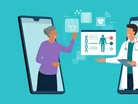Babylon Health: digitising Rwanda's healthcare system

Digital healthcare company Babylon recently announced a collaboration with the Rwandan government, which expands Babylon's Rwandan service, Babyl, to millions more people, in particular women.
Supported by a grant from the Bill & Melinda Gates Foundation, the partnership will allow Rwandans that do not own a smartphone or have a phone number to still register for Babyl using their national ID. This will allow them to have digital consultations with a doctor or nurse, and receive a prescription from any digital or analogue device.
The company says that since it was rolled out in April, Babyl has seen a 64% increase in female registrations and a 55% increase in consultations.
Shivon Byamukama, Managing Director of Babyl in capital city Kigali, explains that Rwanda is one of the few healthcare systems in Africa that has universal healthcare. "Over 85% of the population uses the universal health coverage called Mutuelle. It is based on a referral system with over 60,000 community health workers in the community as well as health posts and health centres who refer patients to district hospitals."
The Rwandan government first partnered with Babylon in 2016 to become the country's main digital healthcare provider. "The government works with Babylon because it believes that technology is the only way to leapfrog and improve the health outcomes of its citizens" Byamukama says. "Through close partnership with the government, Babylon’s technology has been helping to digitally transform Rwanda’s healthcare system to provide easier access to quality care. Five years after its entrance into Rwanda, Babyl has gained 2 million registered patients and completes over 3,000 consultations every day."
Rwanda's healthcare system is more digitally advanced than its neighbours, because it has welcomed tech companies, Byamukama says. "Companies are encouraged to test their ideas here, and if successful, the concepts will extend to other countries. Rwanda has been deliberate in providing and enabling an environment that encourages technological innovation. For example, Rwanda has 95% geographical coverage of 4G and fibre optic connectivity."
Babylon chose to work in Rwanda as part of its mission to expand healthcare services in countries where access is limited. "We’re building specialised digital health services for countries with limited or little access to healthcare" Byamukama explains. "Babyl is integrated into Rwanda’s National Health Insurance Scheme and is the largest digital health provider in the country. As of today, over 30% of the adult population have registered with Babyl. In 2020 we signed a 10 year agreement with the government of Rwanda to work together to further digitise Rwanda’s health system."
As a result, Byamukama says that Rwanda's biggest barrier to healthcare - affordability - has largely been resolved. "As one of the few countries on the continent with universal healthcare, patients using this insurance can seek care without having to spend out of pocket. Rwandans can now access healthcare from anywhere they are with ease.
"Digital tools have revolutionised many services in Rwanda. These digital services should be relevant for the needs of the people, using devices people already have. Given Rwanda’s low smartphone penetration, the Babyl service was designed to work on basic-feature phones. Looking ahead, Babylon is aiming to introduce more digital tools, such as digitally-enabled triage, a service that can also be extended to government healthcare centres. These digital tools will help patients access the care they need faster through triage and, where appropriate, connect them to clinicians via digital consultations."
- How Zipline Uses Drones to Deliver Medicine Across AfricaTechnology & AI
- How is Schneider Electric Making the NHS More Accessible?Hospitals
- How DeepHealth is Using AI to Screen for Breast CancerTechnology & AI
- Martin Carpenter: How Tech is Reshaping Healthcare on JerseyDigital Healthcare



